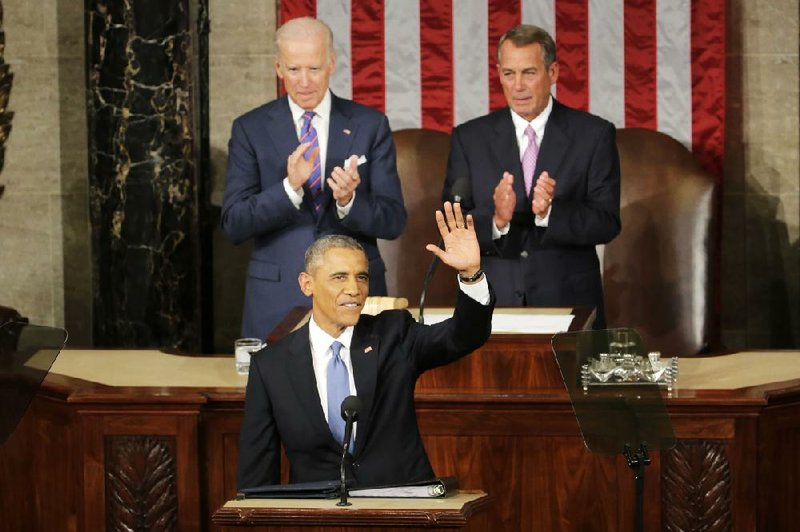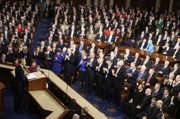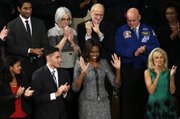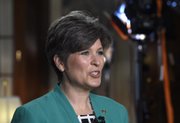WASHINGTON -- President Barack Obama declared Tuesday night that the "shadow of crisis" has passed and urged Congress to build on economic gains by raising taxes on the wealthiest Americans to pay for tax reductions for the middle class.
RELATED ARTICLE
http://www.arkansas…">State delegation less than excited at Obama vision
Obama said it was time to "turn the page" on years of economic troubles, as well as an era of terrorism and war.
"It's now up to us to choose who we want to be over the next 15 years, and for decades to come," Obama said.
Obama was speaking to a Congress controlled by Republicans for the first time in his presidency. But the policies he called for suggested he had no plans to curtail his own agenda in favor of GOP priorities.
The president outlined a wide-ranging agenda intended to address income inequity and help working Americans.
"Will we accept an economy where only a few of us do spectacularly well, or will we commit ourselves to an economy that generates rising incomes and chances for everyone who makes the effort?" Obama said.
He proposed higher taxes on the wealthiest Americans with the revenue to be used to pay for middle-class tax credits and to make community college free.
"The verdict is clear," Obama said. "Middle-class economics works. Expanding opportunity works. And these policies will continue to work, as long as politics don't get in the way."
Obama also repeated promises Tuesday night to veto any attempts by Congress to roll back progress that's been made on his key priorities.
"We can't put the security of families at risk by taking away their health insurance or unraveling the new rules on Wall Street or re-fighting past battles on immigration when we've got a system to fix," Obama said. "And if a bill comes to my desk that tries to do any of these things, it will earn my veto."
The president also called on Republicans to work with him on potential areas of consensus, including a new push to approve far-reaching trade deals in Europe and Asia.
New Iowa Sen. Joni Ernst, giving the Republican response, called for cooperation as well, saying, "There's a lot we can achieve if we work together." But Ernst, in her prepared remarks, saw a less rosy version of the economy than Obama's.
"We see our neighbors agonize over stagnant wages and lost jobs. We see the hurt caused by canceled health care plans and higher monthly insurance bills," she said. "But when we demanded solutions, too often Washington responded with the same stale mindset that led to failed policies like [the Patient Protection and Affordable Care Act]. It's a mindset that gave us political talking points, not serious solutions."
House Speaker John Boehner, R-Ohio, also criticized Obama's proposals Tuesday.
"Tonight isn't about the president's legacy; it's about the people's priorities," Boehner said. "Making government bigger isn't going to help the middle class. More growth and more opportunity will help the middle class, and those are the Republican priorities."
The centerpiece of the president's address was a Democratic tax proposal that could increase the capital gains rate on couples making more than $500,000 annually to 28 percent, require estates to pay capital gains taxes on securities at the time they're inherited and slap a fee on the roughly 100 U.S. financial firms with assets of more than $50 billion.
Much of the $320 billion in new taxes and fees would be used for measures aimed at helping the middle class, including a $500 tax credit for some families with two spouses working, expansion of the child care tax credit and a $60 billion program to make community college free.
Obama also is asking lawmakers to increase paid leave for workers. And he has moved unilaterally to lower a mortgage insurance rate that could help attract first-time homebuyers.
Indeed, the economy is on stronger footing than at any other point in Obama's presidency, with growth on the upswing and an unemployment rate below 6 percent. But Senate Majority Leader Mitch McConnell, R-Ky., cast Obama's proposals for building on the economic gains as little more than "talking-point proposals designed to excite the base but not designed to pass."
McConnell urged Obama to work with Republicans to shore up Medicare and Social Security and balance the budget, not just propose "more tired tax hikes."
While the economy dominated the president's address, he was also promoting his recent decision to normalize diplomatic relations with Cuba and to launch a military campaign against the Islamic State extremist group in Iraq and Syria. He called on Congress to pass cybersecurity legislation and a new authorization for military action in the Middle East.
"I call on this Congress to show the world that we are united in this mission by passing a resolution to authorize the use of force against ISIL," Obama said, referring to the Islamic State.
He says it will take time and focus to stand up to what he calls the "bankrupt ideology of violent extremism." But he says the effort will succeed, vowing to relentlessly hunt down terrorists from "Pakistan to the streets of Paris."
The White House rolled out many of the president's most significant proposals ahead of the speech. And rather than deliver an address littered with policy proposals, Obama talked more about the values that support his agenda and promoted a story of economic recovery.
Republicans' focus
Ernst, in the Republican response Tuesday night, said the new Republican-led Congress will seek to undo damage caused by Obama's economic policies and health-care plan.
"We plan to make Washington focus on your concerns again," Ernst said to Americans in a televised address after Obama's speech. "We heard the message you sent in November -- loud and clear."
Her speech came two weeks after Republicans took control of the U.S. Senate for the first time in eight years and expanded the House majority they won in 2010.
Ernst called for revamping the "outdated and loophole-ridden tax code" and shifting away from Obama's signature 2010 health care law and other economic policies, which she said have hurt low-wage workers.
Like Obama, Ernst called for compromise on trade policy, where the White House and congressional Republicans have identified some common ground.
The State of the Union response, given each year by the party not in control of the White House, is viewed as a potentially high-reward opportunity and often given to those who, like Ernst, are seen as rising stars in their party.
"The attraction for her is she is a new face, so people will be interested in her in a way that -- if it was John Boehner -- they wouldn't be," said Cary Covington, a political science professor at the University of Iowa in Iowa City.
"Her job is going to be to get women to listen to the Republican message for 2016. That's a large part of what she's doing."
In recent elections, women have overwhelmingly backed Democratic candidates for president, a cycle Republicans are trying to break.
Democrats, meanwhile, panned her selection as evidence that the Republican party won't be breaking away from the influence of its Tea Party wing, which backed Ernst.
Both the White House and Republicans stacked their guest lists for Tuesday's prime-time address with people who put a human face on their policy positions.
Among those sitting with first lady Michelle Obama were Chelsey Davis, a student from Tennessee who plans to graduate from a community college in May; Dr. Pranav Shetty, who has been working on the Ebola outbreak in West Africa; and Alan Gross, who was released from a Cuban prison last month as part of Obama's decision to normalize relations with the communist island nation.
Obama touted his decision to resume relations with Cuba after a half-century of estrangement. He said Tuesday that U.S. policy toward Cuba is "long past its expiration date" and urged Congress to end a decades-long economic embargo on the country. Administration officials said they don't expect lawmakers to move on that request quickly.
Boehner, meanwhile, hosted Cuban dissident Jorge Luis Garcia Perez, who spent 17 years in a Cuban prison. Florida Republican Sen. Marco Rubio took Rosa Maria Paya Acevedo, whose father was a well-known Cuban dissident who was killed in a car accident that his family believes was suspicious.
Rubio said he hoped Paya's presence in the gallery would remind Obama that "her father's murderers have not been brought to justice, and that the U.S. is now, in fact, sitting at the table with them."
Not attending the State of the Union address was Transportation Secretary Anthony Foxx. By tradition, one person from the Cabinet always stays away from the Capitol to maintain continuity of government in case of a disaster.
The transportation secretary is 13th in the line of succession. The Cabinet offices fall in line by the chronological order of their establishment.
Foxx is the former mayor of Charlotte, N.C. He became transportation secretary in 2013.
Information for this article was contributed by Julie Pace, Connie Cass, Nedra Pickler and staff members of The Associated Press; by Julie Hirschfeld Davis and Michael D. Shear of The New York Times; and by Kathleen Hunter of Bloomberg News.
A Section on 01/21/2015
28403326



